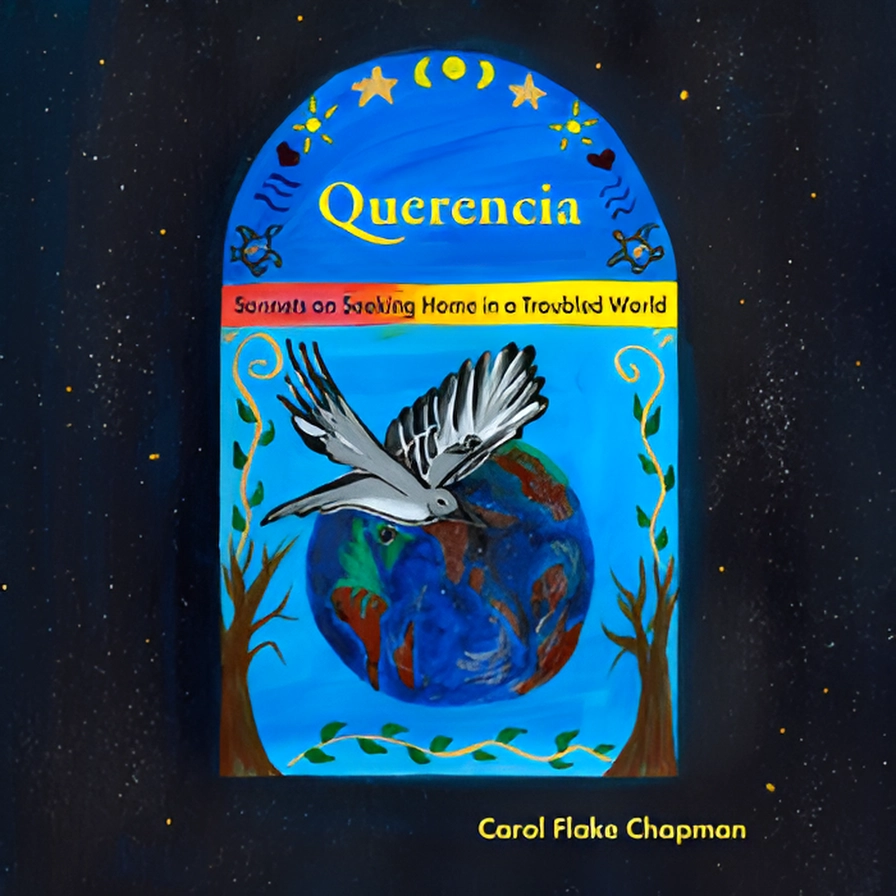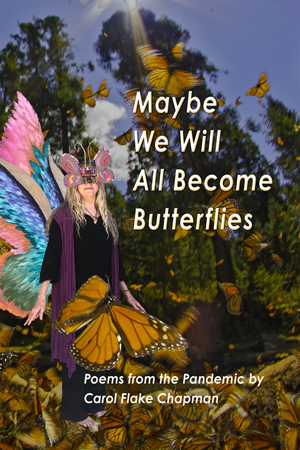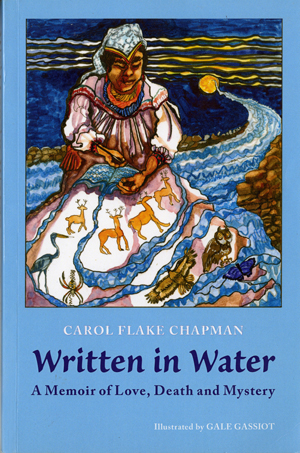Books by Carol Flake Chapman
Healing the World With Words

Querencia
Sonnets on Seeking Home in a Troubled World
How do we know where home is, asks Carol Flake Chapman, when we are always moving away, when the places where we were once rooted have changed, just as we ourselves change? In Querencia: Sonnets on Seeking Home in a Troubled World, she explores our desire to find a sense of belonging and safety in a time when rivers have been drying up, sea levels are rising, the West has been burning, and hurricanes have been getting more frequent and powerful. With a country bitterly divided on so many fronts, finding home has never been more difficult.
She has found the most telling concept of seeking home in this troubled time to be that of querencia, which originated as a term from bullfighting to describe the area in the ring where the bull finds a place of safety. The meaning of querencia has broadened to suggest a feeling of belonging, of finding home. But for the bull, as for most of us, our feelings of safety and belonging are only temporary, as we must often venture out of our safe places, and we must often leave them to seek safety and belonging elsewhere. And from that quest, she suggests in her poems, we create our own places of respite and sanctuary, where we find comfort and meaning.

Wild Surprises
Stories and Poems About Encounters That Shifted My World
In her role as journalist for a number of top newspapers and magazines, Carol Flake Chapman wrote about her unusual adventures into the wild and sometimes into the darkness of human greed that endangered the creatures she had come to love. In Wild Surprises, she tells these stories of extraordinary encounters with unexpectedly responsive creatures that shifted her view of nature, from gorillas in Rwanda, a deadly snake in Mongolia, and a swan that became a friend, to the most famous stallion in the world.
When her role as journalist was shaken to the core by the sudden death of her husband on a river in Guatemala, she returned to poetry, her first love, not only to seek healing but to respond to a world that had gone haywire.
In Wild Surprises, she tells the full story of her encounters in the wild that include the spiritual and synchronous dimensions that shaped her view of the natural world and her role in it. Each story is accompanied by a poem that extends her reflections on what it means to find the common ground and common language that connect us to all of life and to the untamed messengers who sometimes arrive unexpectedly.

Maybe We All Will Become Butterflies
Poems from the Pandemic
Carol Flake Chapman began writing poems about the Covid-19 pandemic early in 2020, responding to the immediate and pressing need to record a turning point in American and world history. Life, she knew, would never be the same again. Maybe We Will All Become Butterflies: Poems from the Pandemic resulted from her daily experiences of surreal and jarring change, of sorrow and loss, of frustration and anger, of loneliness and resilience, and perhaps most of all, of her consolation from the natural world. Her poems about the pandemic have been widely lauded by readers who have said that she has found the words to express the thoughts, fears and hopes that they have been unable to articulate.
Carol is a prize-winning poet who has performed her poems in gatherings around the world, from Texas and California to England, Hong Kong, Mexico, Mongolia and France. She returned to poetry after a long and distinguished career as a journalist, serving as a founding editor of Vanity Fair, and a correspondent, writer and critic for the New Yorker, the Boston Globe, the Village Voice, U.S. News & World Report, the Washington Post, Vogue, Conde Nast Traveler and Texas Monthly, among many others. She has written a number of nonfiction books, including a moving and powerful memoir of her pilgrimage of grief and consolation following the sudden death of her husband on a wild river in Guatemala titled Written in Water: A Memoir and Love, Death and Mystery.

Written in Water
A Memoir of Love, Death and Mystery
Written in Water may alter the way you look at love and death. Almost certainly, it will alter the way you look at grieving. And it may even alter your perceptions of ordinary reality. When veteran journalist Carol Flake Chapman loses her husband suddenly in a kayaking accident on a remote Guatemalan river, she is thrust without warning into a time of grief and shock. But in her altered state, she soon realizes that grief has opened the doors to possibilities of consolation that she could never have imagined. Her time of grieving becomes a kind of improvised pilgrimage that takes her around the world in a journey of discovery, as she explores who her peaceful-warrior husband really was and what her place might be in the world without him.
Along the way, she encounters what she comes to think of as “necessary angels”—people who appear at the right place at the right time with the right words or acts of comfort. She travels into the “thin places”—the places where the boundaries between heaven and earth, between reality and dream, become permeable. She introduces the concept of “Slow Grief,” of a way of grieving that embraces life and that takes comfort in all its small and large miracles. Even technology becomes a means of healing. And in her encounters with the natural world, she finds not only connection and healing, but also a threshold of transformation. As she writes, “the invisible gossamer threads of connection became visible.” And always there is music, some of it coming from what she calls the “cosmic playlist”—songs that deliver timely messages of comfort and meaning
She recounts in raw, moving and often riveting detail the small indignities, the bottomless sorrows and transcendent moments that come with death and the pursuit of healing.